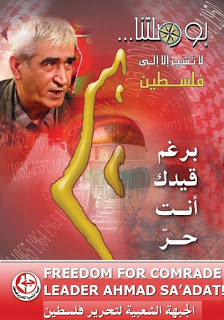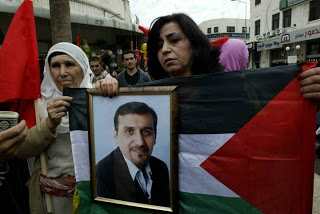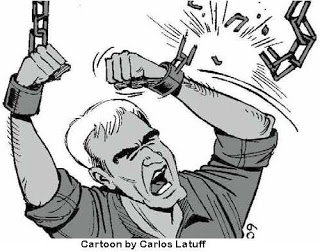Solidarity with Palestinian prisoners is more urgent than ever. Since the announcement of Palestinian prisoners’ hunger strike against the isolation of Ahmad Sa’adat and all other prisoners held in solitary confinement, and against torture and humiliation for prisoners and their families and visitors, Israeli prison officials have stepped up their threats against Palestinian prisoners participating in the hunger strike.
The strike begins today, Tuesday, September 27. The Israeli Minister of Internal Security, at a meeting in Ramon and Naqab Prisons, has threatened to escalate repression against prisoners, threatening to move all prisoners participating in the hunger strike into isolation and solitary confinement, and to forcibly transfer those prisoners to other prisons in the occupation prison system. Prisoners are frequently transferred by occupation forces in an attempt to break up social bonds and disrupt organizing against prison repression.
For decades, Palestinian prisoners have engaged in hunger strikes to demand – and win – their rights, putting their bodies on the line once more to demand the freedom and dignity of themselves, their people, their homeland and their nation. Palestinian prisoners have announced that they will not be moved from their course by the threats of the occupiers. Prisoners’ representatives have confirmed that Sa’adat and fellow isolated leader Jamal Abu al-Haija, in isolation with Sa’adat, will join in the strike themselves.
Furthermore, prisoners announced that they will reject all prison orders, refusing to wear uniforms, stand up for daily counts, or accept food. The situation is more urgent than ever as prisoners begin their strike. The Campaign to Free Ahmad Sa’adat calls upon all solidarity, international justice and human rights groups and organizations to join us to demand freedom, dignity and justice for Palestinian prisoners.
1. Picket, protest or call the Israeli embassy or consulate in your location and demand the immediate freedom of Ahmad Sa’adat and all Palestinian political prisoners. Make it clear that you support the demands of Palestinian prisoners on hunger strike!
2. Distribute the free downloadable Campaign to Free Ahmad Sa’adat flyer in your community at local events.
3. Write to the International Committee of the Red Cross and other human rights organizations to exercise their responsibilities and act swiftly to demand that the Israelis ensure that Ahmad Sa’adat and all Palestinian prisoners are freed from punitive isolation. Email the ICRC, whose humanitarian mission includes monitoring the conditions of prisoners, at [email protected], and inform them about the urgent situation of Ahmad Sa’adat.
4. Email the Campaign to Free Ahmad Sa’adat at [email protected] with announcements, reports and information about your local events, activities and flyer distributions.
The Campaign to Free Ahmad Sa’adat expresses its deepest solidarity with the prisoners on hunger strike in Pelican Bay, California, the United States. These prisoners, inside the racist and brutal US prison system, have also stood together on hunger strike to demand an end to abuse and the use of isolation against prisoners, particularly long-term isolation, to demand proper food, and an end to torture and abuse. They ended their strike in July 2011 after receiving assurances that their demands would be met – however, this has not happened, and prisoners have in fact been punished and further repressed for participating in the strike. The prisoners in California have resumed their hunger strike on Monday, September 26, 2011.
Across the world, prisoners stand on hunger strike, demanding dignity and justice. The Campaign to Free Ahmad Sa’adat salutes the California hunger strikers, expresses our deepest solidarity, and joins in their demands for dignity and justice. We also note the great leaders and great struggles that have emerged from the racist dungeons of U.S. prisons, from Attica to Soledad. The Campaign to Free Ahmad Sa’adat salutes the political prisoners in U.S. jails and the Guantanamo torture camp – and all jails in the world – including Mumia Abu-Jamal, Leonard Peltier, Ghassan Elashi, and hundreds more, and demands their freedom.
The Campaign to Free Ahmad Sa’ adat
[email protected]
Twitter:http://twitter.com/freeahmadsaadat
There are, today, approximately 5,600 Palestinian political prisoners. Palestinians, living under occupation and oppression for over 63 years, have been targeted relentlessly for imprisonment and detention by the Israeli occupation. Nearly every Palestinian family has been touched by political imprisonment. Since the extension of the occupation of Palestine to the West Bank and Gaza Strip in 1967, over 650,000 Palestinians have been taken prisoner – one out of every four Palestinians from the West Bank and Gaza. Forty percent of male Palestinians in the West Bank and Gaza have spent time in occupation jails. Palestinians’ arrest and detention are covered by Israeli military regulations; there are over 1500 of these regulations, which can be altered at any time by the regional Israeli military commander, creating new regulations to which Palestinians must adhere under threat of arrest and imprisonment. At least half of these prisoners have never been tried. Those who have been tried face a military trial, in which three military judges – two of which are not required to be trained in law – pass judgment on Palestinians’ right to live, to organize and to resist military occupation.
PALESTINIAN CHILD PRISONERS
At the age of 12, Palestinian children may appear before military courts, and at the age of 16, may be tried fully as adults. (In Israeli courts, adulthood begins at 18 for Israelis charged with criminal offenses.) There are no juvenile prisons, and Palestinian children often serve their sentences in the same cells as adults. Over 6000 Palestinian children have been detained since 2000, and there are 217 imprisoned Palestinians under 18 at the present time. They share the same treatment – torture and abuse – as their adult fellow prisoners, in contravention of international law concerning the rights of children.
In the occupied West Bank, Israeli military commanders can detain an individual for up to six months without charge or trial. On or just before the expiry date, the detention order is frequently renewed. This process can be continued indefinitely. Administrative detention is often used against Palestinian writers, advocates, or community organizers who are difficult to charge in military court. Administrative detention orders are issued either at the time of arrest or at some later date and are often based on secret evidence. Neither the detainee, nor the detainee’s lawyers are given access to the secret evidence.There are 221 Palestinians in administrative detention currently, including those who have been held for up to 4 years with no charge under repeated secret detention orders, and 9 elected parliamentarians of the Palestinian Legislative Council.
ABUSE AND TORTURE
A Palestinian may be detained and interrogated constantly for up to twelve days without being brought before a judge or even informed why s/he is held. Following this period, the prisoner may be brought before a military judge and charged, sent to administrative detention or released. A Palestinian detainee may go through an initial 180-day period of interrogation; for the first 60 days of that period, he or she may not be seen by an attorney. The use of “moderate physical pressure” in Israeli interrogations is accepted, legal and common. Legalized torture in Israeli jails includes the use of shortshackling, “stress position,” beatings and squeezing of handcuffs, as well as sleep deprivation, humiliation and threats, and many other documented tactics of abuse.
THE CASE OF AHMAD SA’ADAT
Ahmad Sa’adat is a Palestinian political leader, an elected member of the Palestinian Legislative Council and the General Secretary of the Popular Front for the Liberation of Palestine, a Palestinian leftist political party and the secondlargest organization in the Palestine Liberation Organization. He is currently serving a 30-year life sentence in an Israeli prison, convicted on political charges related to his public advocacy and political activity – and has been, since March 2009, held in the isolation/solitary confinement cells of Israeli prisons since that time, denied family visits, reading materials and access to his fellow prisoners.
Sa’adat was abducted with four of his comrades in an Israeli military raid on the Palestinian Authority prison in Jericho on March 14, 2006. Born in 1953, Sa’adat is the child of refugees expelled from their home in the village of Deir Tarif, near Ramleh, in 1948. A math teacher by training, he is married to Abla Sa’adat, herself a noted activist, and is the father of four children. Abla Sa’adat was herself arrested and detained for four months, and prevented from leaving Palestine to speak about Palestinian rights at an international conference. He has been involved in the Palestinian national movement since 1967, when he became active in the student movement.
Prior to his abduction from Jericho in 2006, he had been held at various times as a political prisoner in Israeli jails, for a total of ten years. Sa’adat was elected General Secretary of the PFLP in 2001, following the Israeli assassination of then- General Secretary Abu Ali Mustafa in his office in Ramallah on August 27, 2001. He was kidnapped by the Palestinian Authority in February 2002. For the entire period of Sa’adat’s imprisonment in the PA jails, he had been convicted of no crime; his sentencing- in an illegitimate military court of occupation – came nearly seven years into his detention, after a trial that began after five years of PA/US/British, then Israeli, imprisonment.
Sa’adat has become a national Palestinian symbol of prisoner steadfastness, through his rejection of Israeli military courts and leadership in the prisoners’ movement.
ISOLATION: “SLOW DEATH”
On March 18, 2009, Ahmad Sa’adat was suddenly transferred from Hadarim prison and to Asqelan prison, into solitary confinement, following his widely distributed public statements saluting the resilience of Palestinians in Gaza in the face of Operation Cast Lead.
A severe set of sanctions has been directed at Sa’adat, including denial of family visits, denial of visits to the prison canteen, and fines. These punishments come in addition to an earlier set of draconian sanctions directed at Sa’adat as a result of his leadership in the prisoners’ movement.
His isolation has been extended repeatedly, most recently on May 3, 2011. He has now spent over 775 days in isolation. Sa’adat met this news with a call for urgent and systematic action in Palestine and internationally to demand freedom for Palestinian prisoners, and particularly, to confront the “living death” of isolation and solitary confinement. Isolation is well-known to have severe psychological effects. As Sa’adat said, isolation kills prisoners “socially if not physically.”
“In defense of the justice of our cause and in defense of the legitimate struggle of our people against the occupation, I refuse to recognize the legitimacy of your court or to legitimize your occupation or to stand before either of these. Because what you call a list of accusations and ‘security infractions’ are in reality my patriotic duties…the general duty of resistance against occupation…I would like to reaffirm my pride in belonging to the Palestinian Revolutionary Movement and to the extensions of this movement in the regional, national and international planes that form the components of the international movement against the imperialist system of globalization.” –
Ahmad Sa’adat
The Campaign to Free Ahmad Sa’adat [email protected]



